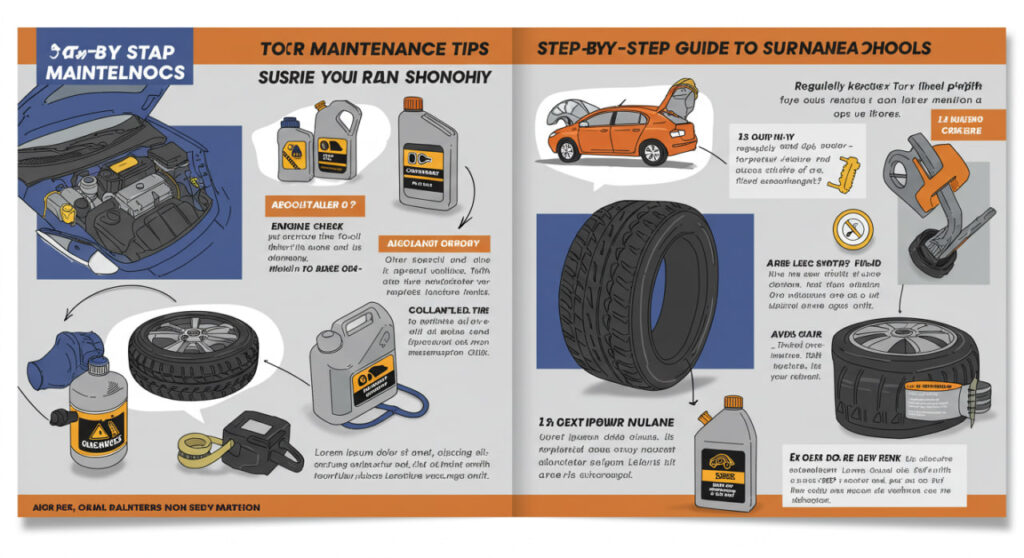Owning a car is a significant investment, and keeping it in top condition ensures it serves you well for years. Regular maintenance not only extends your vehicle’s lifespan but also enhances safety, improves performance, and saves you from costly repairs. Whether you’re a seasoned driver or a first-time car owner, these five essential car maintenance tips will help you keep your vehicle running smoothly. From checking your oil to monitoring tire pressure, these practical steps are designed to make car care approachable and effective, ensuring you enjoy a reliable and smooth ride every time.
Why Regular Car Maintenance Matters
Maintaining your car isn’t just about keeping it shiny and clean—it’s about ensuring every component works harmoniously to deliver optimal performance. Regular upkeep prevents small issues from snowballing into expensive repairs, improves fuel efficiency, and enhances safety on the road. According to the U.S. Department of Transportation, poorly maintained vehicles contribute to thousands of accidents annually. By dedicating a little time and effort to routine checks, you can avoid breakdowns, reduce emissions, and maintain your car’s resale value. Let’s dive into the top five maintenance tips that every car owner should prioritize.
Tip 1: Check and Change Your Oil Regularly
The Importance of Engine Oil
Your car’s engine is the heart of the vehicle, and oil is its lifeblood. Engine oil lubricates moving parts, reduces friction, and prevents overheating, ensuring your engine runs smoothly. Over time, oil breaks down and becomes less effective, which can lead to engine wear and reduced performance. Regular oil checks and changes are crucial to maintaining engine health and avoiding costly repairs.
How to Check and Change Your Oil
To check your oil, park your car on level ground and wait for the engine to cool. Locate the dipstick under the hood, pull it out, wipe it clean, and reinsert it. Pull it out again and check the oil level against the marked indicators. If it’s low, top it up with the manufacturer-recommended oil type. Most experts recommend changing your oil every 5,000 to 7,500 miles, though this varies by vehicle and oil type (conventional, synthetic, or synthetic blend). Always consult your owner’s manual for specific intervals. If you’re not comfortable doing it yourself, visit a trusted mechanic to ensure the job is done right.
Tip 2: Monitor Tire Pressure and Tread Depth
Why Tire Maintenance Is Critical
Tires are your car’s only contact with the road, making their condition vital for safety and performance. Underinflated or overinflated tires can reduce fuel efficiency, affect handling, and increase the risk of blowouts. Similarly, worn-out treads compromise traction, especially in wet or slippery conditions, making regular tire checks non-negotiable.
Maintaining Proper Tire Pressure and Tread
Use a tire pressure gauge to check your tire pressure monthly, ensuring it matches the recommended PSI (pounds per square inch) listed in your owner’s manual or on the driver’s side door jamb. Don’t forget to check the spare tire! For tread depth, use the penny test: insert a penny into the tread with Lincoln’s head facing down. If you can see the top of his head, it’s time to replace the tires. Rotate your tires every 6,000 to 8,000 miles to promote even wear, and consider professional alignment checks to prevent uneven tread patterns.
Tip 3: Replace Air Filters for Optimal Performance
The Role of Air Filters
Your car’s engine and cabin air filters play a crucial role in maintaining performance and comfort. The engine air filter prevents dirt and debris from entering the engine, ensuring efficient combustion and power delivery. A clean cabin air filter keeps the air inside your car fresh, especially if you drive in dusty or polluted areas. Clogged filters can reduce fuel efficiency, strain the engine, and make your car’s interior less pleasant.
When and How to Replace Air Filters
Check your engine air filter every 12,000 to 15,000 miles or once a year, and replace it if it appears dirty or clogged. Cabin air filters should be replaced every 15,000 to 30,000 miles, depending on driving conditions. Replacing them is often a simple DIY task—most filters are accessible under the hood or behind the glovebox. Refer to your vehicle’s manual for exact locations and specifications. By keeping filters clean, you’ll improve fuel economy and enjoy a fresher, healthier driving environment.

Tip 4: Inspect Brakes for Safety
Why Brake Maintenance Saves Lives
Your car’s brakes are arguably its most critical safety feature. Worn brake pads, low brake fluid, or malfunctioning components can compromise your ability to stop, putting you and others at risk. Regular brake inspections catch issues early, ensuring you maintain control in all driving conditions.
How to Maintain Your Brakes
Listen for warning signs like squealing, grinding, or a spongy brake pedal, which indicate it’s time for a check. Have your brakes inspected by a professional every 12,000 miles or if you notice any unusual behavior. Brake pads typically last 30,000 to 70,000 miles, but this depends on driving habits and conditions. Ensure brake fluid levels are adequate and free of contaminants, as dirty fluid can affect braking performance. A proactive approach to brake maintenance ensures you’re always ready to stop safely.
Tip 5: Keep Up with Battery Care
The Importance of a Healthy Battery
Your car’s battery powers everything from the ignition to the lights and electronics. A weak or failing battery can leave you stranded, especially in extreme weather. Regular battery care ensures your car starts reliably and prevents unexpected failures.
How to Care for Your Battery
Check your battery terminals for corrosion (a white, powdery substance) and clean them with a wire brush if needed. Ensure the battery is securely fastened to prevent vibrations that can shorten its lifespan. Test the battery’s voltage every six months using a multimeter, or have a mechanic check it during routine maintenance. Most batteries last three to five years, so replace yours if it’s nearing the end of its life or showing signs of weakness, like slow cranking. Cold weather can be particularly tough on batteries, so be extra vigilant in winter.
Additional Tips for Long-Term Vehicle Health
Beyond these five tips, adopting a proactive maintenance mindset can make all the difference. Schedule regular tune-ups with a trusted mechanic to catch issues early. Keep a maintenance log to track oil changes, tire rotations, and other services, ensuring nothing slips through the cracks. Finally, pay attention to your car’s behavior—unusual noises, vibrations, or dashboard warning lights are often early indicators of problems. Addressing them promptly can save you time, money, and stress.
FAQs
How often should I check my car’s oil?
You should check your car’s oil level every month or before long trips. Change the oil every 5,000 to 7,500 miles, depending on your vehicle and the type of oil used. Always refer to your owner’s manual for specific recommendations.
Can I replace my car’s air filter myself?
Yes, replacing both engine and cabin air filters is often a straightforward DIY task. Consult your vehicle’s manual for the filter’s location and specifications, and ensure you purchase the correct replacement filter for your car model.
What happens if I ignore low tire pressure?
Driving with low tire pressure can reduce fuel efficiency, cause uneven tire wear, and increase the risk of a blowout. It also affects handling and braking, making your vehicle less safe to drive.
How do I know if my brakes need attention?
Signs of brake issues include squealing or grinding noises, a spongy brake pedal, or vibrations when braking. If you notice any of these, have your brakes inspected by a professional immediately.
How can I extend my car battery’s lifespan?
Regularly check for corrosion on the terminals, ensure the battery is securely mounted, and test its voltage periodically. Avoid leaving electronics on when the engine is off, and replace the battery every three to five years.
By following these five car maintenance tips, you’ll keep your vehicle running smoothly, enhance its longevity, and enjoy peace of mind on the road. Regular care is the key to a reliable and safe driving experience, so start implementing these practices today!



